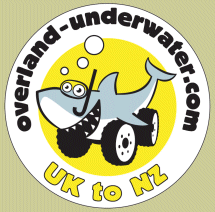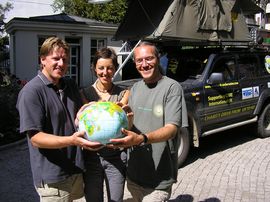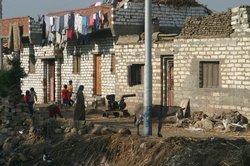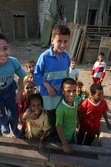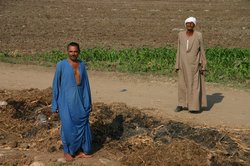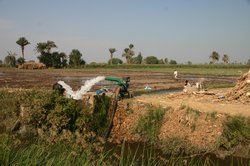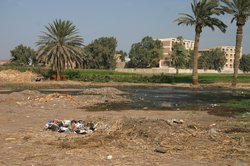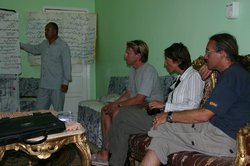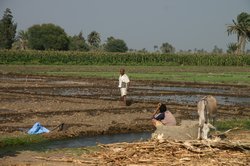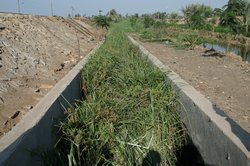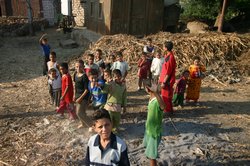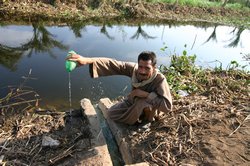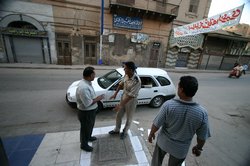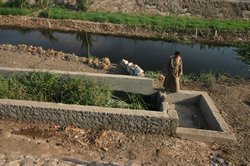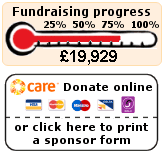| Final Statistics: Alex & Maz | Total distance: 93,550km |
| Furthest Point: Rotorua, NZ | Now settled in Sydney, Australia |
| Final Statistics: Martin | Total distance: 79,698km |
| Furthest Point: Hobart, Australia | Now settled in Bristol, UK |
Visiting the EMPOWERS & ALIVE CARE projects
Egypt, Country 12, Diary entry 14th Oct 2005, Total distance in Egypt: 5428 KM
Beni Suef� after many emails and organisation between the team and CARE Egypt with a few last minute changes thrown in to try and coincide with our hap-hazard movements across the length and breadth of Egypt � we had finally arrived. The visit to Beni Suef and the EMPOWERS & ALIVE project was one of our scheduled highlights for Egypt and one reason for our small detour south from the �obvious� direct route between UK and NZ...!
When we had originally set out on planning our adventure, realising how fortunate we were to be able to undertake such a journey and knowing that our route took us through many of the worlds poorer communities, we were committed to using our trip as a means of raising money to help the excellent work undertaken by CARE International. Many of you have already been kind enough to make generous donations and with �8,043 raised so far we are slowly edging towards our �25,000 target. However if we do happen to be on your Christmas card list this year� please save the pennies and add them to our donations page instead � I�m not sure a card would find us anyway when addressed to: Tinfish, The Green Land Cruiser, Somewhere in the World�!
One of the key objectives during the expedition was to visit some of the CARE International projects across our route first hand to see for ourselves how money raised is put to good use. CARE International supports a staggering 870 poverty-fighting projects in 70 countries, reaching more than 45 million of the world�s poorest people. The project in Egypt was our first such visit and we were all very keen and interested to see how CARE puts their work into action.
It seems strange writing this in Pakistan about a CARE Project in Egypt especially after the devastating earthquake that hit Northern Pakistan 2 months ago and where relief is still very much a priority as the mountain regions head into the winter months. We are currently heading north into the mountains and have been told to expect extreme cold so I can only guess at what hardship the survivors are having to endure on a daily basis. We met an orthopaedic surgeon in Karachi who is helping with the amputees, of which they estimate some 100,000 unfortunately making this region the highest concentration in the world. Horrific facts!
Of course CARE is present in both areas showing the diversity of services that they offer from mobilising disaster relief to improving the lives of poor communities, such as the water and sanitation project we were about to visit.
Parking next to Martin�s Land Cruiser we were escorted up to the office by a policeman where we were warmly welcomed by Mr Alfy Hanna and Mr Galal Moawad from CARE Egypt. We were soon sat with a cup of Chi (even though it was Ramadan they insisted) and listening to them explain the EMPOWERS and ALIVE projects.
The EMPOWERS project aims to improve long-term access to water by vulnerable populations through more effective local integrated water resource management. Egypt has a very high per capita availability of water, but demand exceeds the amount available because of inefficient irrigation in most areas. Egypt is also almost entirely dependent on water originating from outside the country and it is calculated that over 25% of water is used twice and 50% of farmers depend on drainage water to some degree.
The ALIVE project addresses the problem of poorly treated industrial and sewage effluent polluting the water supply by educating the communities and offering assistance in building low cost waste treatment systems. The CARE representatives work amongst the villages to discuss the problems and challenges that they face and then mediate with the local government to make sure the appropriate issues are addressed correctly.
Once we had been given an overview it was off to meet some of the communities. Parked next to our cars now was a police car filled with cops in the back� our un-requested escort who had apparently been flung together after Martin had asked the cops for directions to the CARE Office! A small drive from the office into the rural surrounds we arrived at one of the villages. Here we met Mr Samer Aly Ahmad who was chief of the board for the El Masharka CDA and he showed us how they all get together to brain storm their problems and then put a plan together for resolving.
Next stop a visit to one of the waste treatment systems in a nearby village. Our police escort who we�d not managed to throw yet couldn�t understand why we kept on stopping to take pictures and beeped us impatiently to get moving, which became increasingly annoying! If any of you have been reading our previous experiences with the police in Egypt you�d be none too surprised to hear that we paid them little notice!
It was interesting to see the farmers working in their fields and irrigating the crops� by irrigating I mean completely flooding the land so it was completely underwater which is one of the education challenges being faced by the CARE team. As we drove into one village signs of the lack of sanitation was evident which is obviously a major health issue being faced by these communities.
The low cost sanitation project is working to address this problem of providing houses with basic sanitation needs. It costs �20,000 to install a system capable of providing sanitation to 200 families, which is as little as �100 per household to give them facilities that we all take for granted. The design is quite simple and the initial treatment starts in a septic tank which consists of 3 rooms. The retention room, where anaerobic bacteria break down the solid substance, followed by two rooms of �up flow� gravel filters which continue to break up the organic loads. The final treatment comprises a limestone up flow filter to increase the filtration, followed by gravel bed hydroponics before the clean water empties into the drain.
We strolled around one of the gravel bed hydroponics system watching the dirty black water entering from one end and miraculously 50m on, the clear water leaving into the drainage ditch� the power of mother nature! Word got around that we had arrived and before long the entire village�s children had turned out to wave and cheer.. all good fun until one of the officious policemen that were still shadowing us took it upon himself to hit the children that were gathering � like they were a real security risk! Not a pleasant sight to witness and we let the cop know we were none too impressed.
One of the most import projects that the ALIVE team are heavily engaged in is providing village households with pure drinking water of both high quality and adequate quantity. They are currently constructing 5 water plants for surface treatment using chemical & natural methods to improve the quality, providing for a population of 226,000 and 2 water stations for well treatment by removing manganese & iron minerals that are harmful to human health. The cost of providing this fundamental service is a mere �60 per household!
With the sun showing signs of setting we bade farewell to the villages and headed back to town. The setting of the sun also signifies the ending of the fast so in true hospitable style we were invited to the nearby restaurant for a good feed of kebabs, stuffed aubergines and rice � yum.
Before leaving Beni Suef we wanted to find internet access, but the police who had been waiting patiently for us to eat before escorting us back to where ever (Cairo I think they thought we were going next) were totally bemused when we said we�d be another couple of hours checking email. After much discussion they finally parked outside the internet and posted guards. After annoying us all day and having our skin full of convoys we were going to try everything we could to avoid their prolonged company!
Again we had different plans from Martin and Elena who were heading back to Dahab to go windsurfing, whereas we were going back to Sharm el Sheikh for a complicatedly organised Liveaboard trip with King Snefro that we were very much looking forward to (I only hoped my ear infection � now in full force � would be on the mend by then)
In operation �avoid police�, Martin took the first steps and made a dash for it. The cars were parked a few blocks from the internet caf� and he was accompanied on foot by one of the cops. When he realised Martin was about to drive off he told him to wait one minute before doubling back for re-enforcements. Fortunately an Egyptian minute is calibrated differently to a standard minute and Martin was long gone before the escort arrived.
One escaped� but we were still held up in the internet caf� under close guard� well at least one of the doors! The other exit led onto the side street & sticking our heads out for a recce we could see the police car and a couple of cops loitering about� but they weren�t expecting a break out from this door. Before they knew it we were out and disappearing down the side alley� a quick round the block and we were at the car, in and away..! The only hiccup being that the police were on the only main street out.
After 45mins of negotiating tiny streets, one ways (of which we were the only ones who seemed to be concerned), roads blocked by mass congregations of people praying, we were eventually on the right side of the Nile and on the outskirts of town with only one police check between us and the desert�. Lights off, pick your moment cruise up, wave to them all sat about and we were away into the desert to find our camp for the night�
The overland-underwater team would like to express their thanks to CARE Egypt specifically May Elsoda and Peter Laban for arranging our visit and Alfy Hanna and Galal Moawad for hosting our stay at Beni Suef. Further details of the EMPOWERS project can be found at EMPOWERS. Alfy Hanna has also kindly said that anyone who wants and further details or technical information on the ALIVE low cost sanitation system can contact him directly via email - [email protected]. Click here for a PowerPoint presentation of the ALIVE sanitation and water purification projects.
| All content copyright � overland-underwater.com - please do not use without permission. |
| Comment from jcutsforth |
| Happy Christmas to you all and congratulations.Have followed your progress from the start and am very interested.Heard you on Southern counties.Joan. |
| 16 Dec 2005 @ 16:45:54 |
